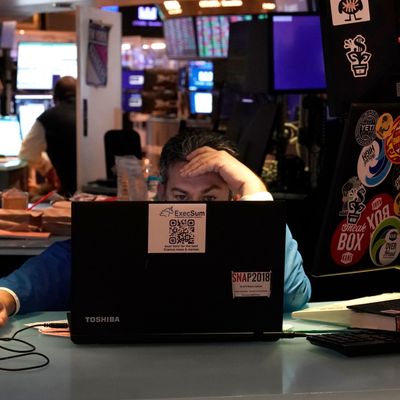
The start of the year has been rough for the investor class. Nearly every day, markets have drifted further from all-time highs reached just a few weeks ago. This past week, things got even more erratic as the Dow Jones zoomed up and down over a huge range of 1,650 points, ultimately ending the week up 1 percent in the most volatile week in a year . What’s weird is that this past week was an important one for clarifying what the overall U.S. economy looked like. Not only did Federal Reserve chairman Jerome Powell give a press conference, but the government and some of the world’s biggest companies released a heap of data — and still, the total economic picture didn’t really change all that much from the end of 2021. Inflation is still here, and it’s still pretty high. Omicron is infecting hundreds of thousands a day, but it appears to be on the downswing nationally. Big companies made a lot of money during the end of the year. It was all in line with, or better than, what economists and investors basically thought in December. So why is the market freaking out?
The short answer is that, while we have a better idea of how the economy is functioning right now, we don’t really have a better sense of when it’s going to get better. This might be jarring because the economy is doing pretty well in a lot of ways — people’s wages are rising; there are more than 10 million jobs open right now; and companies like Apple booked their best quarter ever for revenue. All anyone cares about, though, is inflation. Last year, prices rose 7 percent, the steepest increase since 1982, and since unemployment is under 4 percent and falling, the Fed is operating with a singular goal of keeping inflation from getting worse. The thing is, it might be too late for that, anyway. Powell said Wednesday that inflation is “probably slightly worse” than it was in December, a grim signal for anyone who thought that it had peaked at the end of the year. Other than that, Powell gave no clear answers to the two most important immediate questions around his agenda: When will the central bank hike interest rates, and by how much? (For what it’s worth, he said the Fed was “of a mind” to start hiking rates in March, but only if certain conditions were met, a tautology that clarifies less than it would seem at first blush.)
This is all deeply conflicting for Wall Street, which led the markets to have more sudden, violent shifts than a Merce Cunningham ballet. “Because there’s so much uncertainty around what the economic forecast is for 2022, it’s causing people to adjust very quickly on every little data point,” Charlie Ripley, Allianz Investment Management’s senior investment strategist, told Intelligencer. This week, the data that did come in — like a lower-than-expected compensation report, or a higher-than-expected economic growth report — pulled investors in opposite directions. The differences of opinions are playing out well beyond the stock swings: Bond markets are calm, for instance, while the crypto markets are losing their minds. While markets sometimes differ, it’s a striking contrast given that the economy has been pumped full of stimulus and low interest rates for more than a decade. “There’s a lot of uncertainty around that forecast,” Ripley said, “and a lot of that uncertainty has to deal with, what is the path and trajectory of inflation?”
The thing to watch out for now is how volatile things can really get. During previous economic cycles, Wall Street figured that it was able to push the Fed around by scaring off central bankers from raising interest rates with falling markets, and some of the world’s most powerful hedge-fund managers are trying to gauge how much lower things would have to go before they could force the Fed’s hand. The next inflation report, due February 10, is going to be crucial, but it’s likely to keep confusion high unless Fed officials come out and make more direct statements about the direction of the economy than they have been. “We should expect more volatility as the amount of uncertainty has built up around the pace of change of Fed policy,” Ripley said.






























